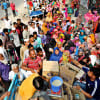Is there an economic roadmap of the interim government?

The interim government of Bangladesh has recently completed its six months in office. Because of certain measures it took at the outset of its tenure, people became somewhat hopeful about the government's good intentions. But as days passed, certain things became clearer. First, it became apparent that the government was not able to solve the problems disrupting the lives of the people. In fact, it was apparent that the government was severely struggling to cope with those challenges. The prime example is economy's persistent high inflation. Second, the mismanagement that characterised the past economy was not over. Thus, an even economic discipline is yet to return, not to speak of economic acceleration. Third, the interim government does not have a clear road map to put the economy on a solid foundation and to steer it forward.
All these phenomena have created a shaky confidence and a sense of despair in people's minds, which now have taken the form of discontent. People are at a loss and cannot fathom that in spite of the presence of so many notable, efficient and experienced luminaries in the government, it is not able to tackle economic challenges. People surely do not expect that all the economic problems will be solved overnight, but they can hope for some improvements and reliefs—at least by the end of six months. Instead, the efficacy of various policy measures undertaken by the government has been questioned. For example, what is the rationale of imposing value-added taxes and supplementary duties on more than 100 items (some essentials were later removed from the list after much criticism), when there has already been a double-digit inflation and sluggish growth in the economy? In fact, at various points in time, people quite clearly expressed that economic issues are the topmost concerns on their minds. Not only people on the street, but also those closely associated with the government have started raising their voices about the government's indifference and ineffective actions on economic issues. People involved with the White Paper have also expressed their despair. Furthermore, the main political parties of the country have also expressed some dissatisfaction by the shortcomings of the government. Given all these, certain issues need to be clarified in the context of economic programmes of the interim government.
First, there is no doubt that Bangladesh has been passing through a transition and as a nation, we have been facing multidimensional challenges—some political, some are related to public administration, some are economic. While the interim government is obliged to give attention to all these concerns, a balance must be maintained in approaching them. But from what is happening, it seems that the government is not as interested in economic matters as it is in political issues. As a result, it is not spending much time on economic issues, compared to the time it devotes to political concerns. The perception seems to be that reforming the economy is the sole responsibility of the talented and widely experienced economists at the top of the government. This is, to be honest, a wrong and not so well-thought approach. If the entire administration of the interim government is not collectively engaged in economic management, the economy will not be fixed.
Second, in addressing and finding solutions for the economic problems, the government must strongly express its commitment to economic concerns. But unfortunately, the actions undertaken so far by the interim government are not creating that kind of a sense. Till now, the government's economic acts give a sense of "some measures here, some reforms there" sort of disparate attempts, and the government must move away from such ad hoc approach. In fact, ad hoc measures provide no relief to the problems, not to speak of solutions. The current high inflation of the country is a prime example of such a phenomenon. In fact, a well-coordinated approach is required to overcome economic woes. At the same time, the interim government must refrain from undertaking inadequate measures, which in fact, may deepen the crises, making them more complex. Such acts by the government make its good intentions, commitments and good considerations irrelevant.
Third, in the economic arena, the government should concentrate on two specific issues—economic management and economic reforms. Both of these dimensions will help the Bangladesh economy to accelerate. In economic management, it is essential to re-establish economic discipline, the checks and balances of the economic structure, and the culture of transparency and accountability. During its tenure, the interim government is neither expected nor supposed to complete all kinds of economic reforms. In that context, the government has to make a conscious decision as to which reforms it would prioritise, what would be the context and the content of those reforms, and also what would be the time frames for those reforms. Many structural reforms, particularly the long-term economic ones, would have to be left for an elected government, as those reforms would have constitutional implications. The economic reforms that the interim government wants to pursue must be brought to the attention of the people with necessary transparency. This is critically important, since no reform can be sustainable without the ownership of the people.
Four, the interim government should present a well-thought blueprint of its economic plan with a spelled-out timeframe. In the pursuit of establishing a society, based on human rights and equality, the major milestones of such a blueprint must also be identified. One important aspect of the blueprint would be an implementation plan with a definite monitoring and evaluation framework. For that, a necessary, robust and credible data set must be mobilised and constructed; so that a good baseline is created for credible monitoring and evaluation outcomes.
Five, it should be realised that having eminent, knowledgeable and experienced people at the top economic leadership of the interim government may be a necessary condition, but not a sufficient one for solving economic woes. A personality-based structure, irrespective of how talented these people are in it, will not produce the desired results. Only if such eminent personalities are surrounded by skilled professionals and experts of economic discipline, the desired good outcomes would be achieved. Only a well-knit and coherent team can collectively tackle the economic problems of the country.
A clearly defined economic roadmap with a timeframe can strengthen the trust and confidence of the people in the interim government. And at the same time, this will enhance people's ownership of the proposed development trajectory of the country and in the ultimate analysis, there is no alternative to such ownership.
Selim Jahan is former director of the Human Development Report Office under the United Nations Development Programme and lead author of the Human Development Report.
Views expressed in this article are the author's own.
Follow The Daily Star Opinion on Facebook for the latest opinions, commentaries and analyses by experts and professionals. To contribute your article or letter to The Daily Star Opinion, see our guidelines for submission.


 For all latest news, follow The Daily Star's Google News channel.
For all latest news, follow The Daily Star's Google News channel. 










Comments